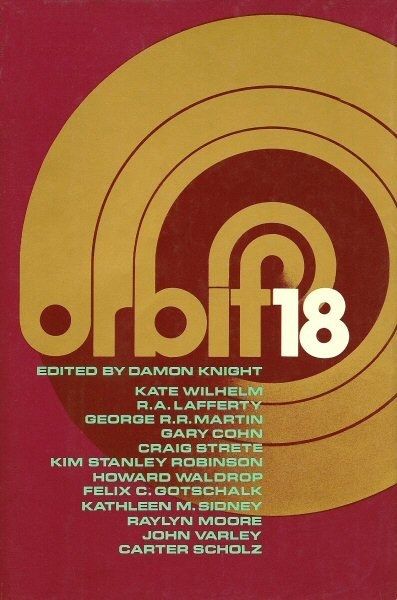But I Don’t Care
Orbit 18 (Orbit, volume 18)
Edited by Damon Knight

8 Feb, 2022
1976’s Orbit 18 is the 18th volume in Damon Knight’s Orbit series of original science. I fear we are deep into diminishing-returns territory here.
Orbit 18 contains fourteen stories; three by women and eleven by men. This volume does not appear to be the award magnet previous volumes were—I only saw one Nebula nomination, for the Waldrop—and five of the stories do not appear to have been reprinted in English. Most of the stories in Orbit 18 are unremarkable and too many of the ones that are not unremarkable are memorable only for their enthusiasm for rape.
Still, the Wilhelm would be as timely now as it was in 1976; the Lafferty was an interesting case of applied media relations; and the Stolz was an effective study of what follows a remarkable and unique achievement. However, these stories are not enough to justify hunting down a copy of Orbit 18.
I sure hope Orbit 19 is better.
Orbit 18 is out of print.
Now for the mini-reviews.
They Say (Orbit 18) • essay by Damon Knight
Finally, an essay re They Say that was interesting. This essay touches on women in SF, briefly and unsatisfactorily, but is sufficiently tantalizing that I’m tempted to track down the original pieces Knight quotes.
“Ladies and Gentlemen, This Is Your Crisis” • short story by Kate Wilhelm
A troubled couple find meaning in reality shows.
“The Hand with One Hundred Fingers” • short story by R. A. Lafferty
A secretive cabal controls PR and by changing how people assess things, they control reality. This is very bad for people who become surplus to needs.
Meathouse Man • [Corpse Handlers] • novelette by George R. R. Martin
A proto-incel, having failed at love repeatedly, turns to animated corpse-women who cannot say no.
“Rules of Moopsball” • short story by Gary Cohn
Exactly what it says on the tin: the rules for a zany field sport. In keeping with the ethos of the 1970s, the game features wenches, who are there to be carried off by the players.
Ah, well, two rape stories in a row has to be a fluke. Right?
“Who Was the First Oscar to Win a Negro?” • short story by Craig Strete
Two unpleasant people explore the shallowest reaches of society.
I noped out of this as soon as it got to the part about violently raping Joanna Russ.
Three in a row.
“In Pierson's Orchestra” • short story by Kim Stanley Robinson
A musician develops his talent at a dreadful cost. But he’s not raped!
The Memory Machine (Orbit 18) • essay by Damon Knight
Another collection of brief snippets drawn from SF. Most interesting element was a piece underlining that, yes, John Campbell was a smug PITA.
“Mary Margaret Road-Grader” • short story by Howard Waldrop
A truck pull contest adjudicated by customs drawn from Native American culture (as perceived by Waldrop) is complicated when a woman enters the contest. There are many consequences, including true love.
“The Family Winter of 1986” • short story by Felix C. Gotschalk
A cooling world presents a close-knit family with many challenges, not least how to resist their growing attraction for each other.
Spoiler: they fail.
“The Teacher” • short story by Kathleen M. Sidney
A spurned teacher seek an activity into which she can invest her love of teaching.
Coming Back to Dixieland • novelette by Kim Stanley Robinson
Music offers escape from dreadful space colonies … but only for those who win a particularly challenging contest.
This is in A Planet on the Table and Remaking History, both of which I own, but I have no memory of it at all. I had forgotten what a prominent place music had in early Robinson.
“A Modular Story” • short story by Raylyn Moore
A hard-working husband is dispatched from one identity to the next, struggling to fill the role designated for him by his handlers.
“The M&M Seen as a Low-Yield Thermonuclear Device” • short story by John Varley
The disruptive children of today are transformed into the docile worker bees of tomorrow thanks to strategically applied operant conditioning and the occasional lobotomy.
Education was something of a recurring them in early Varley. This example is notable for the irritation expressed at a society that forces odd folk (not even neurodivergent) to conform. As far as I can tell, this is one of a handful of Varley stories that has never been collected.
The Eve of the Last Apollo • novelette by Carter Scholz
The first man on the Moon struggles to deal with the anti-climax that follows having been the first man on the Moon. The end of American crewed space flight does not help.
Arcs & Secants (Orbit 18) • essay by Damon Knight
Commentary on the contributors.
